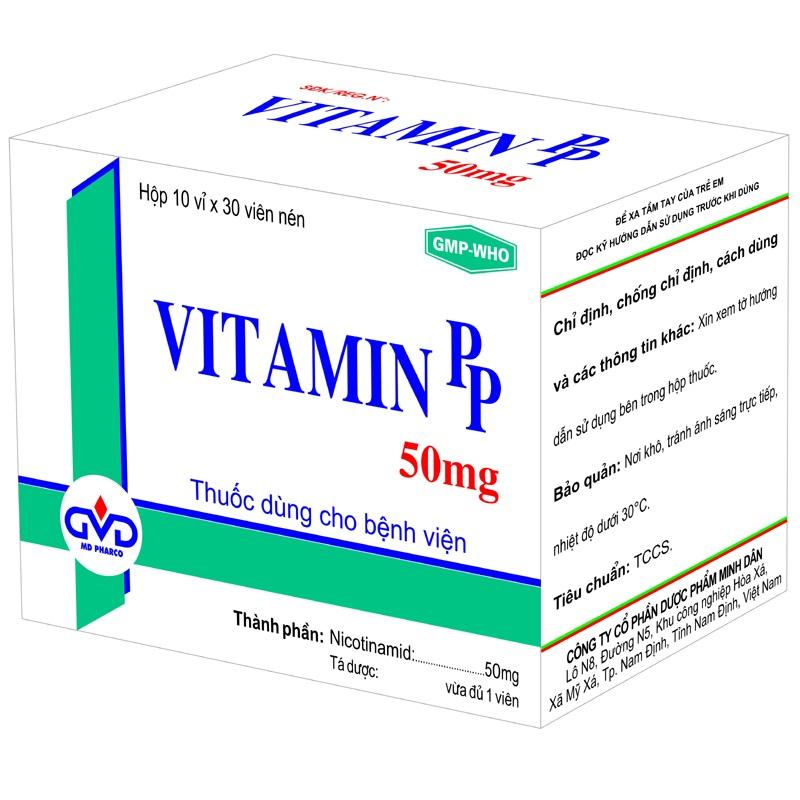What is the effect of vitamin PP?
Vitamin PP, also known as nicotinic acid, is a vitamin B (vitamin B3) commonly used in the 500 mg range. Vitamin PP is found in plants and animals.
Vitamin PP 500mg is used to treat and prevent the lack of natural PP in the body, reducing cholesterol and triglycerides (types of fat) in the blood. This vitamin is also used to reduce the risk of heart attacks in people with high cholesterol who have had heart attacks. Sometimes, PP is used to treat atherosclerosis.
Dosage
The information provided can not substitute for the advice of the medical professional. Always consult your doctor or pharmacist before making any decisions.
How is vitamin PP used for adults?
Regular doses for adults with vitamin PP deficiency: You take 10-20mg once a day. Vitamin PP can also be injected on the skin as a form of multivitamin.
How to use vitamin PP for children?
Male:
Children age 14 to 18: You give your child 16mg per day.
Female:
Children 14-18 years of age: You give your child 14mg per day.
How to use
How should you take vitamin PP?
You should take vitamin PP exactly as directed on the label or as directed by your doctor. You do not use in large quantities or smaller or longer than indicated.
Vitamin PP should be taken before bedtime with a low-fat snack.
If you have any questions during drug use, ask your doctor or pharmacist.
What should I do in case of overdose?
In an emergency or overdose, call the nearest emergency center 115 or go to the nearest local health unit.
In addition, you should record and bring along the list of medications you take, including prescription and over-the-counter medications.
In case of overdose, your doctor will use common measures such as vomiting, gastric lavage, symptomatic treatment and support.
What should I do if I forget a dose?
If you forget to take a dose, use as soon as possible. However, if you are close to the next dose, skip the missed dose and take the next dose at the scheduled time. Do not double the prescribed dose.
Side effects
What side effects will you have with PP?
Call your doctor right away if you have any of the following serious side effects:
Heart palpitations or irregular rhythms;
Shortness of breath;
Swelling;
Jaundice or eyes;
Muscle aches, allergies or have symptoms of fever or flu and dark urine.
If you have diabetes, talk to your doctor about any changes in your blood sugar level.
Less serious side effects of PP 500mg include:
Dizziness;
Warm skin, redness or subtle skin sensation;
Itching, dry skin;
Sweat or chills;
Nausea, diarrhea, belching;
Muscle pain, spasm;
Sleep problems (insomnia).
This is not a complete list of all side effects and may have other side effects. If you have any questions about side effects, consult your doctor or pharmacist.
Caution / Warning
Before taking vitamin PP, what should you keep in mind?
Before taking the medicine, you should tell your doctor or pharmacist if:
You are pregnant or breastfeeding. You need to take the medicine prescribed by your doctor in this case;
You are allergic to any of the ingredients;
You are taking other medicines (including over-the-counter, prescription, herbal and functional supplements);
You intend to use drugs for children or the elderly;
You are or have had a medical condition.
To make sure you take the 500mg PPP safely, talk to your doctor if you have any of the following conditions:
Liver or kidney disease;
Heart disease or uncontrolled angina;
Stomach ulcers;
Diabetes;
Gout;
Muscular dystrophy as infarction.
There are no adequate studies to determine the risk of this drug during pregnancy or lactation. Before taking medicine, always consult your doctor to weigh the benefits and risks.
Drug interactions
What PP can interact with?
Vitamin PP can alter the activity of other drugs you are taking or increase the effect of side effects. To avoid drug interactions, it's a good idea to write a list of what you are taking (including prescription and over-the-counter medicines, herbs and functional foods) and see your doctor or pharmacist. To ensure the safety of your medication, do not take medication, discontinue or change the dose of medication without your doctor's permission.
You should tell your doctor about all of the other cholesterol-lowering medicines you're taking with the 500mg PP, especially atorvastatin (Lipitor®, Caduet®), fluvastatin (Lescol®), lovastatin (Mevacor®, Altoprev®, Advicor ®, pravastatin (Pravachol®) or simvastatin (Zocor®, Simcor®, Vytorin®, Juvisync®).
You should consult your doctor or pharmacist if you are taking any of the following medicines together with vitamin PP:
Blood thinners such as warfarin (Coumadin®, Jantoven®);
Synthetic vitamins or mineral supplements containing vitamin PP;
Antihypertensive drugs or cardiovascular drugs such as amlodine (Norvasc®, Caduet®, Exforge®, Lotrel®, Tekamlo®, Tribenzor®, Twynsta®, Amturnide®), diltiazem (Cardizem®, Cartia®, Dilacor®, Diltia®, Diltzac®, Taztia®, Tiazac®) , felodipine (Plendil®), nicardipine (Cardene®), nifedipine (Procardia®, Adalat®), nimodipine (Nimotop®), nisoldipine (Sular®) or verapamil (Calan®, Covera®, Isoptin®, Verelan®); Nitro-Bid®, Nitro-Dur®, Nitrostat®, prazosin (Minipress®), or terazosin (Nitro-Dur®, Nitrostat®), isosorbide (Dilatrate®, Imdur®, Isordil®, Monoket®, Sorbitrate®) (Hytrin®) .VP drugs can interact with food, drinks? Food, alcohol and tobacco can interact with certain drugs. Talk to your doctor about taking pills with food, alcohol and tobacco. What health conditions affect PP? Your health can affect the use of this medication. Tell your doctor if you have any health problems. Prescription drugsHow to preserve vitamin PP? You should preserve at room temperature, avoid moisture and avoid light. Do not store in the bathroom or in the freezer. You should remember that each drug may have different preservatives. Therefore, you should read the packaging instructions carefully or ask your pharmacist. Keep medicines out of the reach of children and pets. Do not throw the medicine in the toilet or plumbing unless required. Instead, discard the medicine properly when the medicine is overdue or can not be used. You can consult with a local pharmacist or local waste disposal company about how to dispose of the drug. What types and levels of PP are available? PP in the form of tablets, 50mg, 100mg , 500mg.Products containing vitamin PP PP in the food? PP is also called vitamin nicotinamid. Vitamin PP is a water-soluble B vitamin found in many foods such as yeast, meat, fish, milk, eggs, green leafy vegetables and grains. In addition, tuna, green leafy vegetables, broccoli, tomatoes, carrots, sweet potatoes, avocados are a good source of food and are rich in vitamin PP.




